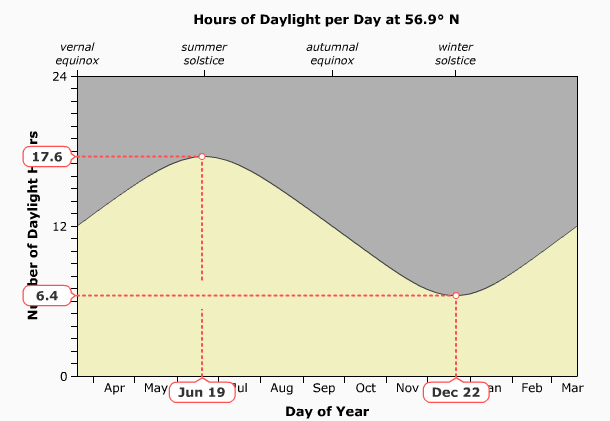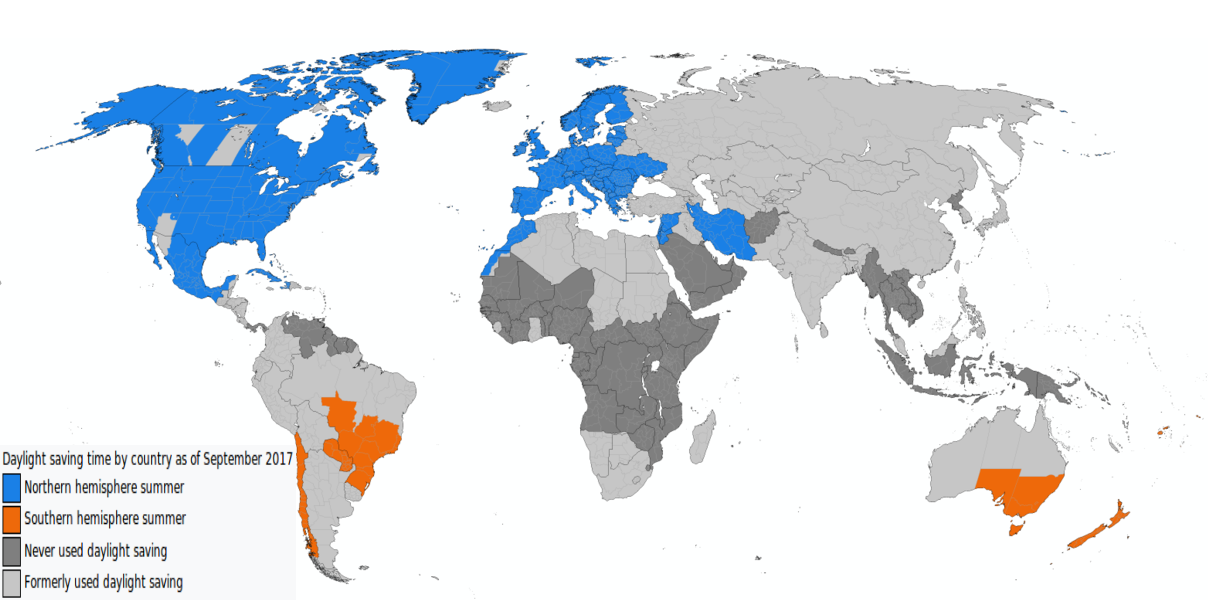Did you adjust your clock?
"The Murders in the Rue Morgue" story by Edgar Allan Poe describes brutal murder that, during the investigation, was revealed to have been committed by a barber's orangutan. It tried to imitate its master, only instead of a shaved beard it got a slitted throat. I call it monkeying.
Adjusting clocks for "daylight saving" is also monkeying.
Let's remember some truths from school. The axis of the school globe is tilted to emphasize that the Earth's axis of rotation is tilted by 23.5° relative to its path around the Sun. The tilt of the axis creates the seasons, because, depending on the Earth's position relative to the Sun, the length of the day (and night) changes. Beyond the polar circles (farther than >±66.5°) the day lasts half a year, followed by a half-year-long night. In the so-called "temperate zone" (±23.5° — 66.5°) the length of day and night varies from a few to many hours. At the equator (<±23.5°) there are no seasons at all, because day and night are always about 12 hours long1:
Assuming that people are active for 16 hours a day, in the "temperate zone" it is advantageous to arrange life so that there is sunlight during these hours. The idea of "daylight saving" by changing the hands of the clock arose at the end of the 19th century. At that time, electricity was mainly used for lighting factories and offices, and almost all people worked in offices "from 9 to 5" or in factories "from whistle to whistle". Since electricity was practically not used at home, the idea arose that the fixed working hours should be adjusted so that before or after it (depending on the shift), the remaining daylight could be used to the maximum for relaxation.
Here in Latvia (56.9° North latitude), the day (and conversely the night) varies in length from approximately 6 to 18 hours:
Therefore, for 2 months in the summer, the day is longer for us than the necessary 16 hours, and for the other 10 months — too short. Even if changing the clocks adjusts people's movements to daylight hours, the effect is only noticeable for a few weeks in the fall and spring, when daylight time is exactly 16 hours.
If at the end of the 19th century, calculations showed that "daylight saving" in the USA and Canada reduced electricity consumption by 3.5%, then in 2008 — by only 0.5%. And even these calculations are questioned by other researchers, because in the United Kingdom in 2009 researchers found that electricity consumption due to the transition to summer time increased by 2%. Partly because people, when together in the office, use lighting more efficiently than each person in their own home. Nowadays, people use artificial lighting both at work and at home, so the electricity they save at work is spent on leisure. Currently, electricity is being used less and less for lighting — fluorescent bulbs are used practically everywhere instead of old incandescent bulbs, and light-emitting diodes are also being introduced, which are much more efficient than the incandescent bulbs used in the past. In turn, electricity is being used more and more in other sectors, especially in transport and heavy industry. With increasing automation, so-called lights out) factories are becoming increasingly popular, where no electricity is used for lighting at all. As a result, electricity consumption is determined practically only by transport and other energy-intensive industries, not by lighting.
If someone decides to sleep longer on weekend, they turn off their alarm clock, instead of turning ther clock back by few hours. If a restaurant owner decides to open the restaurant earlier in the summer, they put a special mark on the opening hours sign saying "We offer breakfast from 7AM!".
Some believe that "in the spring — forward, in the fall — back" is a natural "law" that is easy to follow. If it is "natural", can you answer without thinking what the clock showed at this same hour of the day according to the "old time"? Statistics show that a few days after the clocks are changed, the number of traffic accidents, heart disease and suicides increases. The inconvenience caused by the clock changes is estimated in the billions in the US alone, which is why more and more countries no longer use daylight saving time:
In fact, our clocks are set by politics. The middle-aged remember that we used to live on "Moscow time", which was an hour (or 2 hours in the summer) ahead of our local time, but the older generation probably remembers that in the past we did not switch to "Summer time" at all (as in 2000). Since 2010, we have been subjecting ourselves to European bureaucrats with our clocks, just as we tolerate other bureaucratic procedures of the European Union.
We also have other traditions — Christmas and Midsummer, which we celebrate with pleasure. However, by honoring these traditions, we do not try to deceive ourselves and "prove" that these traditions have "positive economic effect".
The initiative all the time observe "summer time" created on the portal manabalss.lv has been signed by more than 11k+ people. I do believe that we should live according to our zone, or so-called "winter time", but in any case, living according to summer time all the time is better than having to live on a monkey twice a year.
- ^ In fact, the length of day and night also varies slightly at the equator, but the light received on the Earth's surface there is much more affected by clouds than by a few minutes shorter or longer day.
Created by Valdis Vītoliņš on 2025-03-29 07:59
Last modified by Valdis Vītoliņš on 2025-03-30 13:04






